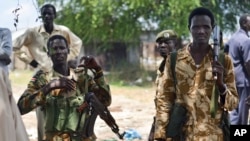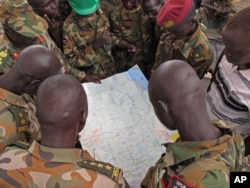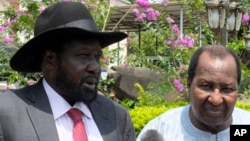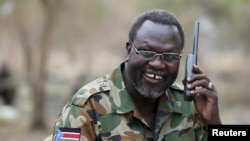A leading South Sudanese dissident has called for all opposition groups to come together to chart a new way forward as the country's civil war enters its fourth year.
More than two years of internationally backed talks have failed to achieve peace between the government and the main rebel group, known as SPLA-IO. The conflict between rebels and various militia groups has left tens of thousands of people dead, and led more than 1 million to flee the country.
Joseph Bangasi Bakosoro, a former governor, launched the South Sudan National Movement for Change in an effort to include armed and unarmed opposition groups in negotiations with the government.
"The issue of South Sudan is not only the IO and the government,” Bakosoro told VOA from exile in the U.S. “There are so many actors there who need to be part of the discussion, and we need to bring all of them together so that when we broker the peace, it will be a lasting peace in South Sudan, without leaving anyone outside the process of negotiation."
President Salva Kiir's regime held Bakosoro as a political prisoner for four months in 2015 and 2016 before releasing him.
‘Nobody can talk freely’
South Sudan is not safe for opposition members, Bakosoro said.
"Nobody can talk freely now in South Sudan,” he said. “We need a dialogue that will bring everyone on board in a neutral zone, so we [can] discuss the reality of the problem of South Sudan."
While Bakosoro said he favors nonviolence, he says some opposition groups want forceful regime change.
"We need to use negotiation as a priority because so many South Sudanese have died, have been killed in war,” he said. “We need to use that peaceful approach."
Bakosoro's call for opposition unity comes after Kiir launched his own national dialogue process in Juba.
SPLA-IO leader Riek Machar has criticized Kiir's dialogue as only including pro-government voices. South Sudanese church groups have voiced similar concerns.
Bakosoro was also critical, saying Kiir's dialogue is not genuine.
"It's just a one-sided dialogue,” Bakosoro said. “You are just dialoguing with yourself. ... Why the government is arming the front line, fighting in the field, and at the same time calling for national dialogue?"
Youth forum
Bakosoro is not the only one proposing alternatives from outside South Sudan.
A group of 30 South Sudanese youth leaders — including government and opposition supporters — met this week in Nairobi to try to chart a new way forward.
Peter Biar Ajak, who organized the South Sudan Young Leaders Forum, said they could not safely hold the event inside South Sudan.
"Many youth of South Sudan do not feel well-represented by the different parties,” Ajak said. “Even those in Juba from government-held areas feel they are trapped in a box that does not represent their aspirations."
Participant Agyedho Adwok said that although the youth leaders came from different tribes and political beliefs, they spoke their minds and peacefully got to know each other.
"You've had diverse views, very strong views, but I have to say we've been able to put aside our differences,” Adwok said. “We're not fighting, we're not killing ourselves, we're expressing ourselves. That is definitely an advantage."
As the war drags on in South Sudan, such alternative approaches may be the country's best chance at finding new paths to peace.







